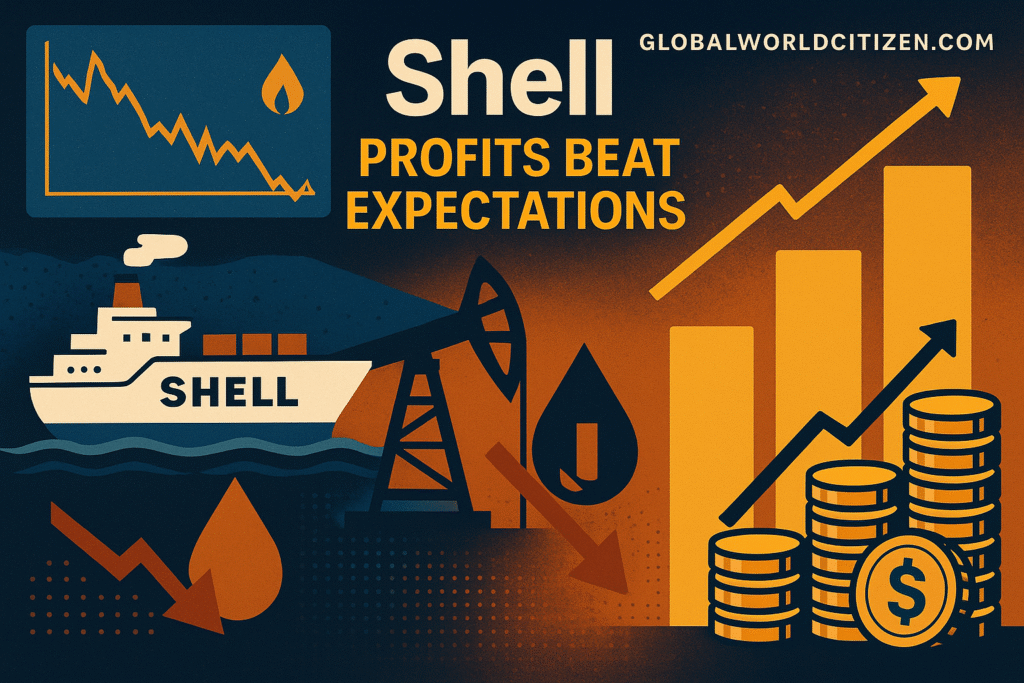Published: May 2, 2025 👤 Author: Global Energy Desk 🌐 Source: GlobalWorldCitizen.com
 Share Buybacks Continue as Energy Giant Doubles Down on Fossil Fuels
Share Buybacks Continue as Energy Giant Doubles Down on Fossil Fuels
London, UK – May 2025
Global oil and gas titan Shell plc has once again defied market expectations, reporting $5.6 billion in Q1 2025 earnings, outpacing analyst forecasts despite declining oil and gas prices. The energy giant also announced a bold new $3.5 billion share buyback program, continuing a 14-quarter streak of aggressive shareholder rewards.
With Brent crude hovering below $62 per barrel and natural gas markets cooling, Shell’s performance solidifies its status as one of the world’s most profitable and shareholder-friendly energy companies.
 Declining Profits, But Still Ahead of Forecasts
Declining Profits, But Still Ahead of Forecasts
Shell’s adjusted earnings fell from $7.7 billion in Q1 2024, impacted by:
-
Lower liquefied natural gas (LNG) output
-
Weaker global gas prices
-
A subdued quarter in oil and fuel trading
-
Operational disruptions in Australia due to cyclones and maintenance
However, the reported $5.6 billion still outpaced consensus forecasts of $5 billion, demonstrating Shell’s resilience in volatile energy markets.
 Shell CEO Wael Sawan: “We’re Strong Even at $50 Oil”
Shell CEO Wael Sawan: “We’re Strong Even at $50 Oil”
CEO Wael Sawan, who has led the company since 2023, reassured investors that Shell remains profitable even in a lower-price environment:
“Shell is in the best shape it’s been in for years. Even at $50 oil, we can sustain $6–$7 billion in annual buybacks.”
Sawan also highlighted robust demand in:
-
Marine and shipping fuel
-
Trucking diesel
-
Jet fuel and aviation energy
-
Petrol for passenger vehicles
Contrary to recession fears, Shell reports no significant drop in real-world energy consumption.
 Global Strategy Shift: Fossil Fuels Over Renewables?
Global Strategy Shift: Fossil Fuels Over Renewables?
While Shell previously committed up to £25 billion in UK energy investments — 75% of which was earmarked for renewables — the company is now scaling back its green energy ambitions. Sawan clarified:
“We were going to be much more in renewable generation. I’ve now been very clear — we don’t see our strength in that.”
Shell’s new direction prioritizes global capital competitiveness, emphasizing profitability and scalability in its core oil and gas operations.
 UK Windfall Tax and North Sea Energy Outlook
UK Windfall Tax and North Sea Energy Outlook
Shell also absorbed a $500 million charge tied to the UK’s Energy Profits Levy, extended through 2030. Despite the tax, Sawan sees potential in the North Sea, though he acknowledged it offers a “limited runway” for expansion.
“Renewables and low carbon are absolutely necessary. But we must also ensure profitability and scale.”
 Strong Market Reaction
Strong Market Reaction
Shell’s shares climbed 2.8% to £25.05, driven by:
-
Steady performance in upstream oil production
-
Robust marketing revenue
-
Strength in global oil trading operations
RBC Capital Markets described the results as “solid,” highlighting Shell’s ability to balance traditional oil revenues with market-facing business segments.
 GlobalWorldCitizen.com Insight: The Future of Energy Strategy
GlobalWorldCitizen.com Insight: The Future of Energy Strategy
Shell’s Q1 results underscore a critical shift in the global energy industry:



For global investors, policymakers, and sustainability advocates, Shell’s pivot raises serious questions:
-
How committed are energy giants to the green energy transition?
-
What does this mean for climate policy and global energy security?
-
Can fossil fuel leaders remain competitive in an increasingly carbon-conscious world?
At GlobalWorldCitizen.com, we will continue tracking the global energy transition, corporate climate strategies, and how oil majors like Shell are reshaping the future of energy investment.
 Featured In:
Featured In:




